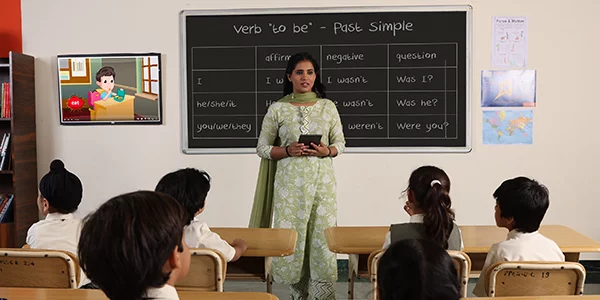Expert Tutors Offering Primary Science Tuition Singapore for All Grades
Expert Tutors Offering Primary Science Tuition Singapore for All Grades
Blog Article
Discovering the Various Mentor Techniques in Main Scientific Research Education And Learning Today
The landscape of primary scientific research education and learning is advancing, with various teaching techniques gaining prestige in modern classrooms. Inquiry-based discovering, hands-on experiments, and the assimilation of modern technology are redefining exactly how educators involve young minds. Furthermore, collaborative strategies and distinguished direction are being employed to accommodate the varied needs of students, enhancing both involvement and understanding. As we take a look at these approaches, questions arise concerning their efficiency and the effects for future instructional methods. What might these shifts in technique mean for the future generation of students?
Inquiry-Based Knowing
Inquiry-Based Understanding (IBL) is a pedagogical strategy that encourages trainees to discover scientific ideas via wondering about, investigation, and hands-on experimentation. This approach stresses the duty of trainees as energetic participants in their understanding, promoting crucial thinking and analytical abilities. By involving with real-world concerns, pupils become interested and determined, which boosts their understanding of clinical concepts.
In IBL, teachers serve as facilitators, assisting trainees as they navigate their queries instead of supplying details straight. This student-centered strategy permits differentiation, accommodating numerous discovering paces and styles. Pupils create abilities in developing hypotheses, creating experiments, and analyzing data, which are essential for clinical literacy.
In addition, IBL cultivates cooperation amongst students, encouraging them to share ideas and searchings for. This collective inquiry advertises social abilities and a sense of area within the class. Furthermore, the procedure of query motivates resilience, as trainees learn to embrace failing as a tipping rock toward understanding.
Hands-On Experiments
Hands-on experiments are an essential part of efficient science education, matching the principles of inquiry-based knowing. These experiments permit trainees to involve straight with scientific principles, promoting a much deeper understanding via experiential knowing. By adjusting materials and observing end results, young students can comprehend abstract concepts in concrete ways.
Such tasks promote vital reasoning and analytical abilities, as trainees hypothesize results, conduct experiments, and analyze outcomes. This process motivates them to ask questions, fine-tune their understanding, and create a scientific state of mind. Hands-on experiments can be customized to varied understanding designs, making certain that all students have the chance to involve meaningfully with the material.
Moreover, hands-on experiments commonly urge partnership amongst peers, promoting teamwork and communication skills. Functioning in teams makes it possible for students to share ideas, review searchings for, and gain from each other, which enhances their general academic experience.
Integrating hands-on experiments right into the main scientific research curriculum not just enriches the learning atmosphere however additionally grows a long-lasting passion in science. By actively taking part in their education, trainees are extra most likely to establish an enthusiasm for scientific query that prolongs beyond the class.

Modern Technology Integration
Incorporating technology into primary scientific research education and learning has actually come to be significantly necessary in cultivating pupil involvement and boosting learning outcomes. Using electronic devices, such as interactive simulations, online laboratories, and instructional software, gives pupils with possibilities to discover clinical concepts in ingenious methods. These resources assist in a much deeper understanding of complicated topics by allowing students to picture and manipulate variables that would be impractical in a traditional classroom setup.
Additionally, innovation integration encourages personalized finding out experiences. Trainees can proceed at their own rate, reviewing challenging principles through multimedia sources, which accommodate various discovering styles. This flexibility not just supports private growth but additionally cultivates a feeling of autonomy in students.
Furthermore, innovation offers as a bridge to real-world science, linking pupils with present research and specialist contributions. Accessibility to clinical journals and online data sources expands pupils' perspectives on scientific questions and promotes vital assuming skills.
Collaborative Knowing
Joint understanding plays an important duty in main science education and learning by cultivating teamwork and communication abilities amongst trainees. This method motivates students to collaborate, share knowledge, and participate in analytic, which boosts their understanding of scientific ideas. By joining group tasks, pupils discover to express their concepts, listen to diverse point of views, and work out remedies, every one of which are important skills in both scholastic and real-world contexts.

Research shows that joint discovering can bring about increased inspiration and interaction in science subjects, check that as pupils find pleasure in shared experiences (primary science tuition Singapore). Additionally, this method prepares pupils for future collaborative ventures, equipping them with the abilities necessary for efficient team effort in greater education and learning and professional atmospheres. Inevitably, welcoming collaborative knowing in key science education can dramatically enrich the learning experience and advertise a much deeper understanding of clinical questions
Distinguished Guideline

Distinguished guideline can manifest in different means, such as varying the content, procedures, or items of knowing. For example, instructors might make use of tiered jobs that give differing levels of complexity, enabling trainees to operate at their respective preparedness degrees. Additionally, versatile grouping strategies can assist in cooperation amongst students with different capacities, promoting peer learning.
Assessment plays a vital role in this approach, as it educates direction and helps instructors comprehend each student's special requirements. Developmental evaluations, such as quizzes and monitorings, can direct educators in readjusting their techniques to improve discovering outcomes. primary science tuition Singapore. Eventually, by carrying out differentiated direction in key scientific research education, instructors can cultivate an extra efficient and fair knowing environment, equipping all students to reach their complete possibility in understanding scientific sensations
Verdict
In summary, the diverse mentor approaches in main scientific research education, including inquiry-based discovering, home hands-on experiments, technology combination, joint learning, and separated guideline, jointly add to a more effective discovering atmosphere. These approaches advertise critical thinking, analytical skills, and a deeper comprehension of clinical concepts. By executing these techniques, teachers can produce helpful and appealing classrooms that attend to the different requirements of trainees, eventually promoting a lifelong interest in science and improving academic achievement.
Inquiry-Based Learning (IBL) is an instructional strategy that urges pupils to discover clinical ideas with questioning, investigation, and hands-on testing.Collective knowing plays a vital duty in key scientific research education and learning by promoting team effort and communication skills amongst trainees.Research shows that joint discovering can lead to boosted inspiration and engagement in scientific research topics, as students locate satisfaction in common experiences.In promoting a comprehensive discovering environment, differentiated direction arises as an essential strategy to suit the diverse demands and capabilities of students in key science education and learning. Ultimately, by implementing separated instruction in main science education and learning, teachers can cultivate a much more efficient and equitable understanding atmosphere, encouraging all students to reach their full possibility in comprehending clinical phenomena.
Report this page